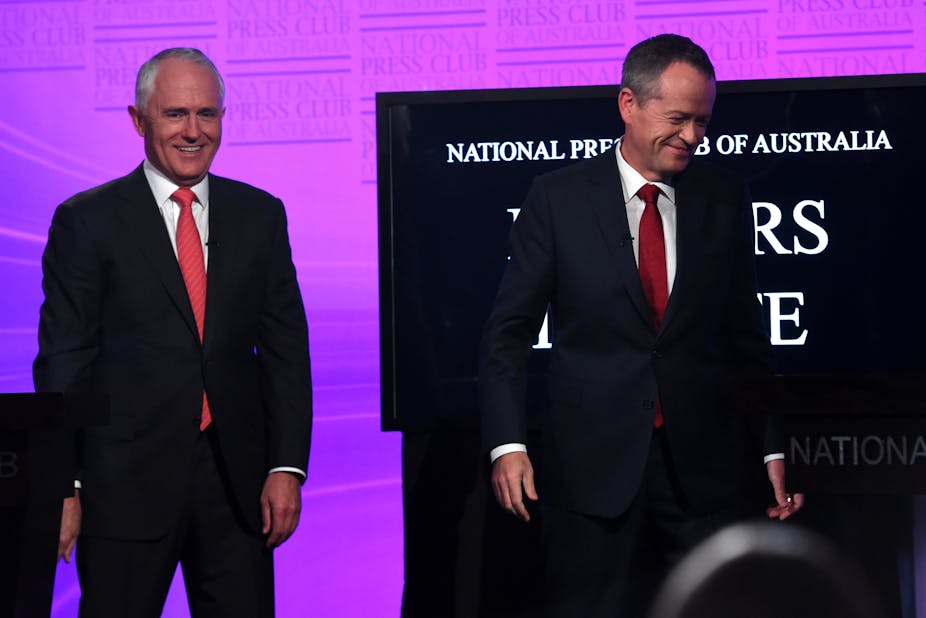Amid general agreement that the National Press Club leaders’ debate was a turnoff, literally, Malcolm Turnbull has decided to be Mr Digital Man and organise things his way.
The government has negotiated with Facebook and news.com.au for an encounter early next week that would be streamed on the two platforms, with questions submitted via Facebook and a moderator in charge of proceedings. Other media could take the stream.
“My aim is to have as big an audience as possible and to reach everyone, you have to use the devices which I noticed you are all holding in your hands,” Turnbull told reporters on Tuesday. “That’s the modern world. That’s the smart phone era,” he enthused.
To digress: if anyone is still looking for the “real Malcolm” here he is. The smartest of smartphone owners. This man who looks up facts during a dinner party loves devices.
In elections what’s done about debates involves a good deal of muscling up – by the players and the media. Candidates seek settings and formats that work to their strengths and avoid those likely to expose their weaknesses. There are various try-ons, as media outlets push for advantage.
Over the decades the media landscape has dramatically altered. In the early days of these federal debates – which started in the 1980s – the public attention was much greater than now. Commercial (then only free-to-air) TV was interested; the Nine Network was at the centre of things. There were “worms” – and vigorous arguments about worms.
In recent years, Sky has become the centre of much of the non-ABC political coverage. But Sky is pay TV; it’s highly viewed by the political class but with a small audience out in voterland. Sky was able to get the two leaders for a people’s forum early in this campaign.
Bill Shorten has done lots of people’s forums and they suit him. The questions from ordinary voters work in his favour, because they tend to be focused on services and the like, more than on high-end economics.
Sky pitched for another leaders’ contest by announcing there would be a forum in Brisbane on Wednesday night. Shorten was delighted. Maybe Sky thought it could pressure Turnbull into participating – but instead he was censorious.
“Sky News announced they were inviting me and Bill Shorten to attend a debate on a particular night … Normally you would have approached us and sought to have come to some arrangement. You chose not to do that and to issue in effect a decree and we’ve said ‘no’,” he said.
Shorten will get a bit of positive publicity if he does well at the forum. But because it won’t be a head-to-head it will lack much significance (unless there is a glitch). Shorten declared that if Turnbull didn’t turn up “it’s an insult to Queenslanders”, but, let’s face it, most Queenslanders won’t give a damn – though the Courier Mail, which is co-sponsoring, is another matter.
Turnbull, setting out his position, said there’d already been a forum and the traditional Press Club debate. “It’s traditional to have three debates so let’s have the third one in an innovative way, and [one] that every Australian can participate in, that allows the interactivity that the old formats that really come from the pre-smartphone, pre-social-media era … don’t allow,” he said.
“We are in 2016. This is the 21st century. This is the time of innovation. This is the most exciting time to be an Australian and to participate in an election debate in the media of our time.”
Shorten has accepted the Turnbull proposal, slightly snarkily. “This is the first time we have heard of this debate proposal,” a Labor spokesman said.
“There’s no doubt Mr Turnbull isn’t comfortable talking to ordinary Australians.”
“It is remarkable that the man who promised the NBN would be finished by the end of 2016 yet has delivered it to less than 20% of Australia would propose an online debate.”
The last debate of the campaign will be an interesting test of whether the new media can get greater engagement than the old media did in the first two contests.

